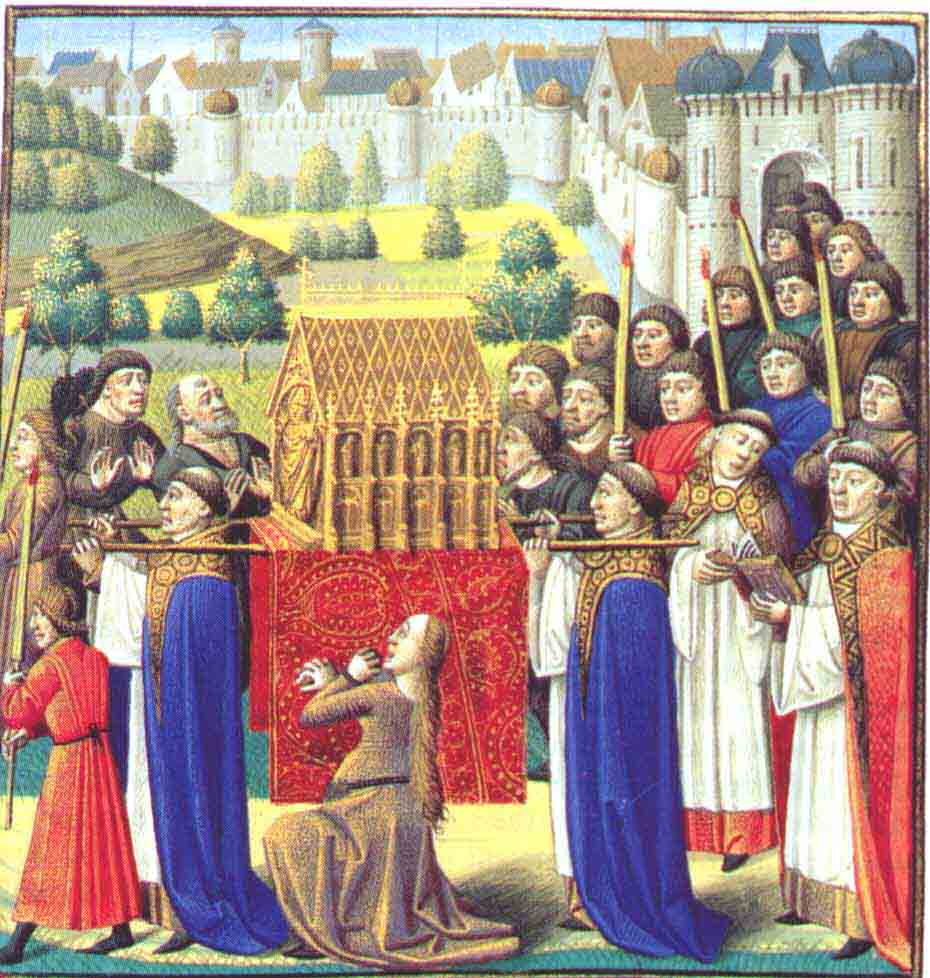
|
Medieval
Drama and Theatre Studies is an Internet Assisted course designed to
connect dramatic texts with theatre history from 900 to 1500: a period
which represents a cycle starting from itinerate players on the fringes
of respectable society; to devotional dramas inside cathedrals, monasteries,
nunneries and great halls; to popular, guild-sponsored biblical cycle
plays in town squares and ditches outside the city walls; and finally,
out of favor again as much a result of religious and civic censorship
as the appearance of Vitruvius books on architecture in 1486, which
challenged the medieval representation of time as a cycle. The
course will contextualize medieval drama and theatre on the basis of
several motives: to establish religious orthodoxy; to expand new-found
leisure time into recreation; and to use resources to finance public
events. Specific readings and historical materials will aim at submerging
students in medieval life and thought as reflected in medieval performances.
To this end, selected cycle plays will be read for their distinctive
features, that is, how they differ from one another as well as from
their biblical origins. Additionally, attention will be given to the
ingenuity of medieval staging devices, financial records, public literacy
and social codes; lives of performers; and common practices during theatre
performances.
Owing to Internet Assistance, the flavor and color of medieval life will be facilitated by links to recordings of music from the middle ages; visual resources representing medieval art and architecture; library holdings of prestigious medieval academies; and both ancient and modern examples of medieval theatre performances. Students will have special access to video recordings of the FJU 2000 Medieval Festival and Forum which feature five medieval plays and scholarly paper presentations. Coursework and student-teacher
communications will be computer-assisted. Selected relevant critical
texts include: (1) Medieval Drama by David Bevington, ; (2) The Medieval
Stage by E. K.Chambers; (3) A New History of Early English Drama, edited
by John D. Cox and David Scott Kastan; (4)Theatre in the Middle Ages
by William Tydeman; and (5)The Medieval Theatre by Glynne Wickham.
|
|
Course textbooks |
|
John
C. Coldewey, ed. Early English Drama (An Anthology), New York and London:
Garland Publishing, Inc., 1993.
|
| Tony Harrison. The Mysteries, London and Boston: faber and faber, 1985. |
Complete dramatic
texts include:
|
Everyman,
Wisdom, Mankind, The Digby Mary Magalene, and three cycles from The
Mysteries -- The Nativity,
The Passion and Doomsday
|
|
Selected dramatic texts from The Brome and Chester Cycles Abraham and Isaac, The Digby Killing of the Children Internet text from one of the York Cycle of Mystery Plays ( to be chosen by the student) |
Selected Historical Readings :
|
The course will examine the following plays in depth: Everyman, Wisdom, Mankind, the Digby Mary Magdalene and the three cycles of Mystery Plays (The Nativity, The Passion and Doomsday) arranged by Tony Harrison. Reference Materials : Carole Armstrong. Lives and Legends of the Saints. London : Francis Lincolm, 1995. Sylnan Barnet, Morton Berman and William Burto, Eds. The Genius of the Eartly English Theatre. New York : A Mentor Book, 1962. David Bevington, Medireview Drama. Boston : Houghton Mifflin Company, 1975. Oscar Brockett. History of the Theatre. Boston : Allyn Bacon, 1995. (7th Edition) Gail McMurray Gibson. The Theatre of Devotion (East Anglian Drama and Society in the Late Middle Ages. Chicago : The University of Chicago Press, 1989. Peter Happe. Ed. English Mystery Plays. Middlesex, England : Penquin Books, 1985. S. M.Houghton. Sketches from Church History. Edinburgh : The Banner of Truth Trust, 1980. Milton D. Hunnex : Chronological and Thematic Charts of Philosophies and Philosophers. Grand Rapids, Michigan : Zondervan Publishing House, 1986. Simon Trussler. The Cambridge Illustrated History of British Theatre. Cambridge : Cambridge University Press, 1994. List of readings : 1.Roman Britain
and the Early Middle Ages 2.The High Middle Ages 3.The Early Church
to the Rise of Islam 4.Religion and Philosophy Charts 5.The Church 6.The
Parish 7.The New Theatre 8.School and Scholars ; Books and Authors 9.Small
Business 10.Explanatory Notes Section III 11.Maps of Europe in Early
and Late Middle Ages 12.reconstruction of mansion in medireview church
|
¡@Course requirements
| 10%Class participation |
| 35%Three short (1 - 2 pages) essays and five identification quizzes |
|
15%One longer essay (5 - 7 pages) |
|
20%Midterm exam (to include both short essay and objective questions |
|
20%Final exam (to include both short essay and objective questions) |
|
*Proposed essay topics and questions will be given to students in advance; other topics may be substituted by special permission. The contents of papers will be evaluated on the basis of originality, understanding, use of research methods and language accuracy. Obviously, plagiarism is unacceptable |